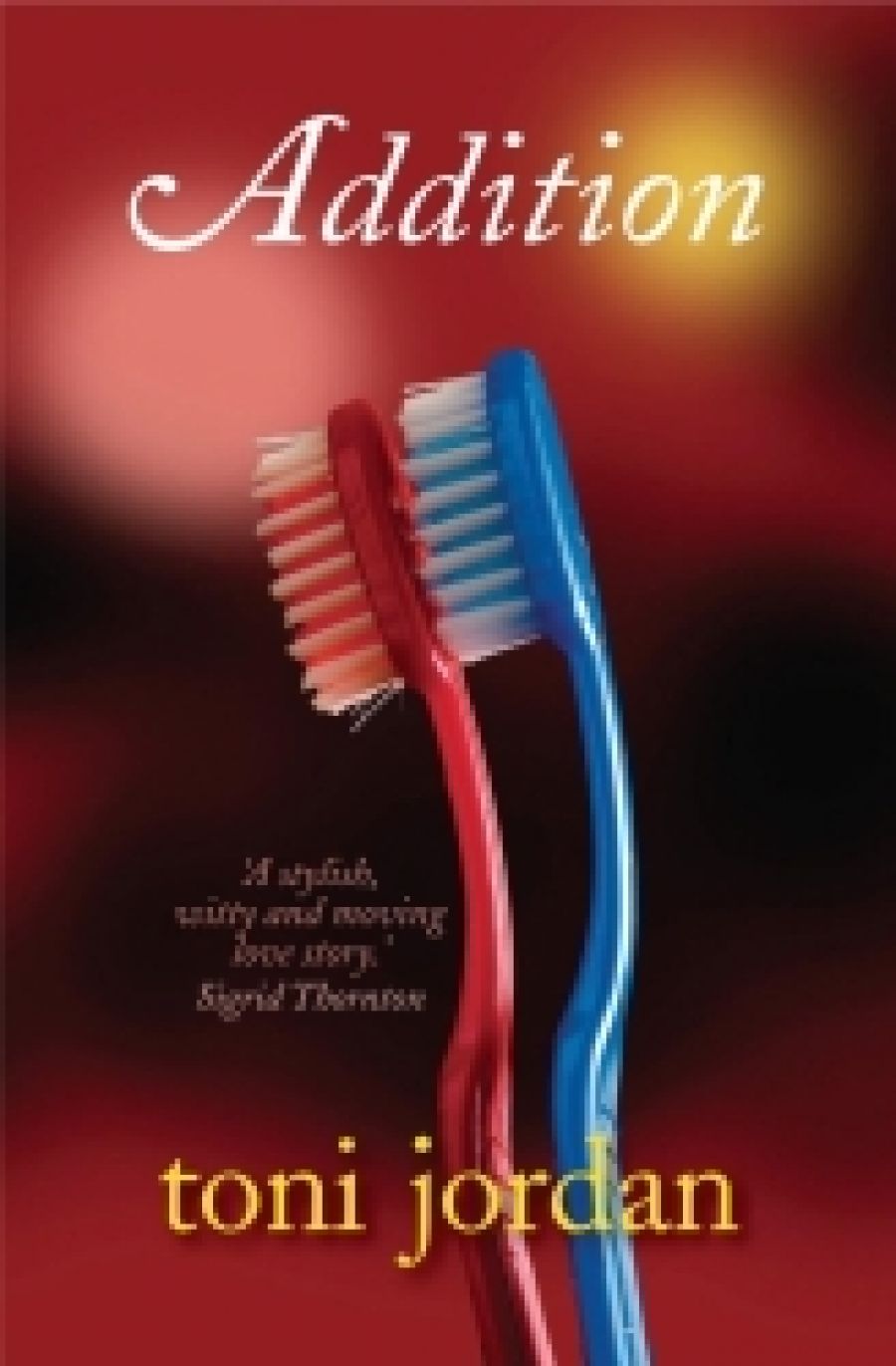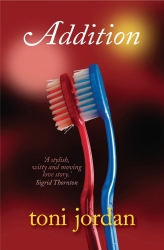
- Free Article: No
- Contents Category: Fiction
- Custom Article Title: A chick-lit Trojan Horse
- Review Article: Yes
- Article Title: A chick-lit Trojan Horse
- Online Only: No
- Custom Highlight Text:
Addition is a trojan horse of a novel. It has a cutesy cover (featuring amorous toothbrushes), a kooky love story and a ‘hot’, wisecracking blonde heroine. There is a ‘hunky’ Irish love interest, Seamus O’Reilly, and a push-pull attraction of opposites between the romantic leads – whose first meeting, of course, is a witty war of words. But the heroine, Grace Vandenberg, is no ditsy Bridget Jones everywoman. She is an obsessive-compulsive counter who lives on a dis-ability pension; her only friends are her mother, her sister and her niece. And she is devastatingly smart.
- Book 1 Title: Addition
- Book 1 Biblio: Text, $29.95 pb, 224 pb
- Book 1 Cover Small (400 x 600):

- Book 1 Cover (800 x 1200):

Despite living in a characterless flat in suburbia (Glen Iris), and despite her daily routine – orange cake at the same café, the same chicken dinner, the same bedtime – Grace is scathing about the predictability of ‘average’ lives. Shopping centres, television, fashion and four-wheel drives all come in for a drubbing. Average people are colour blind. ‘They are tone deaf. They are ants racing across my balcony as the sun is rising only to race back as it sets.’ Grace goes on a blind date with a Swiss baker, thinking he might be interesting, only to be horrified when he turns out to be a Swiss banker. And her romantic hero is eighteenth-century inventor Nikola Tesla, a fellow ‘counter’ with other resonant similarities to Grace’s life that only become clear towards the end of the novel.
The story takes place in four distinct stages. One: the set-up. Girl meets boy, girl has verbal sparring match with boy reminiscent of 1930s screwball heroine, girl lands boy. Two: time for a change. Girl realises she wants a normal life (and normal relationship) after all. Boy convinces girl to seek professional help to over-come her addiction to counting. Love drives her to push her misgivings aside and work at it: take her medication, attend therapy sessions. Here, a discordant note creeps in. Grace’s mother and sister are not as overjoyed about her decision to seek help as you would expect. (‘You said therapy is an attempt to force round pegs into square holes. That individuality is a blessing, not a curse.’)
Stage Three is where it gets really interesting. Girl seems to be on her way to a cure, but she is also losing her sense of self – in fact, she’s becoming everything she used to despise. Seamus practically moves in, but the anti-depressants have removed Grace’s formerly raging libido: instead of sex, there’s television, which seems to have replaced conversation, too. Grace’s weekly phone conversations with her mother used to irritate her; now they chat happily about housework and their favourite on-screen chefs. Describing Stage Four would, of course, ruin the ending, but you get the idea. Having seduced her readers with a light and fluffy (albeit smarter than your average chick-lit) set-up, Toni Jordan gently leads them further and further into unexpected territory.
Addition raises a lot of questions about our values and our society, couched in disarmingly easy-to-read prose. Why is a banker, not a baker, considered a good catch? How many of us watch more life on the screen than we experience outside our homes? Why is there so much pressure to be like everyone else? What is ‘normal’? Is our society over-medicalised?
The central relationships in the book are lovingly rendered, all the more so for Grace’s lashings of spot-on satire about them all. After all, real-life relationships are a mix of affection and annoyance. The people we love drive us mad; we know their flaws by heart, but we love them anyway. (Grace on her mother: ‘She is sweet, loving and accepting. I am conscious of millions of my brain cells atrophying as she speaks.’)
The hero, cinema usher and football fan, Seamus, is probably the weakest thing in the book. His half of the flirtatious repartee with Grace sparkles, but he doesn’t really come into his own as a character. His lack of depth may be a casualty of the first-person narration: we don’t get much of an insight into what drives him.
Traditional chick-lit allows the reader a glimpse of themselves in a rose-coloured mirror, reflected back just that little bit funnier, cooler and more loveable. Addition illuminates our society under fluorescent lighting, depicting us in all our ridiculous illogic. (The ‘improved’ Grace muses: ‘Why on earth do girls wear those sunglasses that make them look like flies? I want a pair.’)
In the end, though, Addition doesn’t stray so far from its genre as to be unrecognisable. The core message of this kind of book is about being loved on your own terms, by someone who appreciates the ‘real you’. What Addition does is to broaden the definition of what your own terms (and the ‘real you’) can include.


Comments powered by CComment